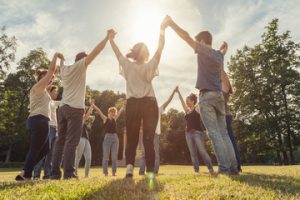Communities are the foundation of society. They provide a sense of belonging, safety, and shared purpose, allowing individuals to thrive both personally and collectively. Building strong and supportive communities is essential for fostering social cohesion, promoting well-being, and creating a better future for everyone. Through collaboration, active participation, and the cultivation of shared values, communities can empower residents, strengthen connections, and address common challenges effectively.

The Importance of Community Strength
A strong community is one in which members feel connected, valued, and engaged. This sense of strength comes from trust, communication, and shared responsibility. Communities that prioritize these elements are better equipped to handle crises, provide support to vulnerable members, and foster an environment in which all individuals can reach their potential.
Social bonds in strong communities contribute to mental and emotional well-being. People who feel connected to their neighbors are less likely to experience feelings of isolation or loneliness, and they are more likely to collaborate on initiatives that improve the collective quality of life. Beyond individual benefits, strong communities contribute to economic growth, public safety, and civic engagement.
Fostering Inclusivity and Diversity
Supportive communities recognize the value of diversity and inclusivity. Embracing differences in culture, background, age, and perspective enriches community life and promotes mutual understanding. Inclusive communities ensure that every member has a voice and feels empowered to contribute to decision-making processes.
Inclusivity begins with open dialogue and active listening. Community programs, local events, and forums that encourage participation help build bridges between different groups, fostering empathy and cooperation. By valuing diversity, communities can leverage the unique strengths and talents of each member, creating innovative solutions to shared challenges and cultivating a sense of belonging for all.
Volunteerism and Civic Engagement
Active participation is a cornerstone of supportive communities. Volunteerism and civic engagement allow individuals to contribute their skills, time, and resources for the collective good. Whether through neighborhood cleanups, educational initiatives, or community outreach programs, volunteers strengthen social ties and provide critical services that improve daily life.
Civic engagement extends beyond volunteer work. Attending community meetings, participating in local governance, and collaborating on neighborhood projects ensures that residents have a say in shaping policies and initiatives that affect their environment. Engaged citizens create communities that are responsive, resilient, and adaptive to change.
Education and Skill Development
Education plays a pivotal role in building strong communities. By providing access to knowledge, skills, and resources, communities empower individuals to achieve their personal and professional goals. Educational programs, workshops, and mentorship initiatives not only enhance individual capabilities but also benefit the community as a whole.
Skill development programs can address local needs while fostering innovation and self-reliance. For example, training in sustainable practices, digital literacy, or entrepreneurship equips community members with tools to create positive change. Knowledge sharing and collaborative learning strengthen social networks and encourage a culture of growth and mutual support.
Support Networks: Caring for One Another
A hallmark of a supportive community is the presence of strong social networks that assist during times of need. Support can come in many forms, including emotional encouragement, financial help, mentorship, or access to resources such as food banks and healthcare services.
By establishing reliable support systems, communities ensure that vulnerable members are not left behind. These networks also foster trust and cooperation, encouraging individuals to reciprocate and contribute to the welfare of others. Over time, the presence of strong support systems strengthens resilience and cultivates a culture of empathy and solidarity.
Sustainable and Resilient Communities
Building a better tomorrow requires communities to think about long-term sustainability. Sustainable communities balance growth with environmental responsibility, resource management, and social equity. Initiatives such as community gardens, green spaces, renewable energy projects, and recycling programs demonstrate a commitment to both ecological stewardship and social well-being.
Resilience is closely tied to sustainability. Communities that plan for natural disasters, economic shifts, or other unexpected challenges are better able to adapt and recover. By fostering collaboration and resource-sharing, communities create a safety net that helps members navigate adversity while maintaining a high quality of life.
Promoting Communication and Collaboration
Effective communication is essential for strong communities. Open, transparent, and respectful dialogue fosters trust, prevents misunderstandings, and encourages problem-solving. Community leaders and members alike benefit from platforms that facilitate information-sharing, whether through local newsletters, social media groups, or town hall meetings.
Collaboration amplifies the impact of individual efforts. By pooling resources, knowledge, and skills, community members can achieve goals that would be difficult or impossible to reach alone. Collaborative initiatives also create a sense of shared ownership, reinforcing commitment to collective success and strengthening the bonds between residents.
Celebrating Achievements and Culture
Celebration and recognition are powerful tools for building community spirit. Festivals, cultural events, awards, and public acknowledgment of individual or group achievements reinforce a sense of pride and belonging. Celebrating shared successes encourages continued participation, fosters unity, and highlights the positive impact that members have on their community.
Cultural activities, in particular, create opportunities for learning, appreciation, and exchange. They strengthen identity, honor traditions, and cultivate inclusivity, all of which contribute to a vibrant and supportive community environment.
A Vision for a Better Tomorrow
Building strong and supportive communities is a continuous process that requires dedication, collaboration, and vision. By fostering inclusivity, promoting education, supporting volunteerism, and creating reliable support networks, communities can empower individuals while enhancing collective well-being.
Sustainability, resilience, communication, and celebration further strengthen social bonds, ensuring that communities are prepared to face challenges and seize opportunities. When members feel connected, valued, and engaged, they are more likely to contribute positively, creating a cycle of mutual support and growth.
A better tomorrow begins with communities that prioritize collaboration, empathy, and shared purpose. By investing time, resources, and energy into building strong and supportive environments, we not only enhance the quality of life today but also lay the foundation for generations to come. Through collective effort and commitment, communities can thrive, ensuring that every individual has the opportunity to flourish within a safe, nurturing, and vibrant environment.